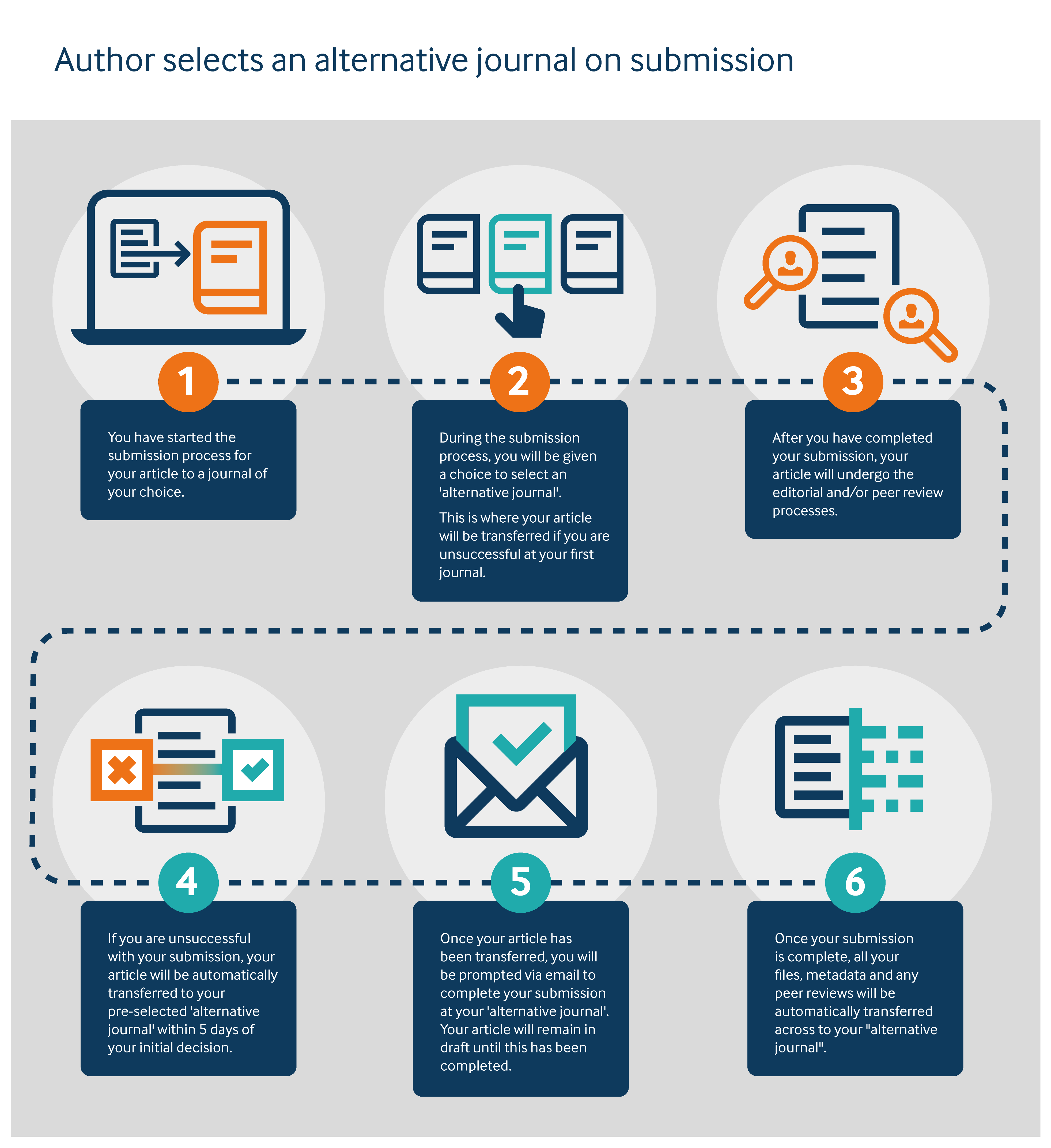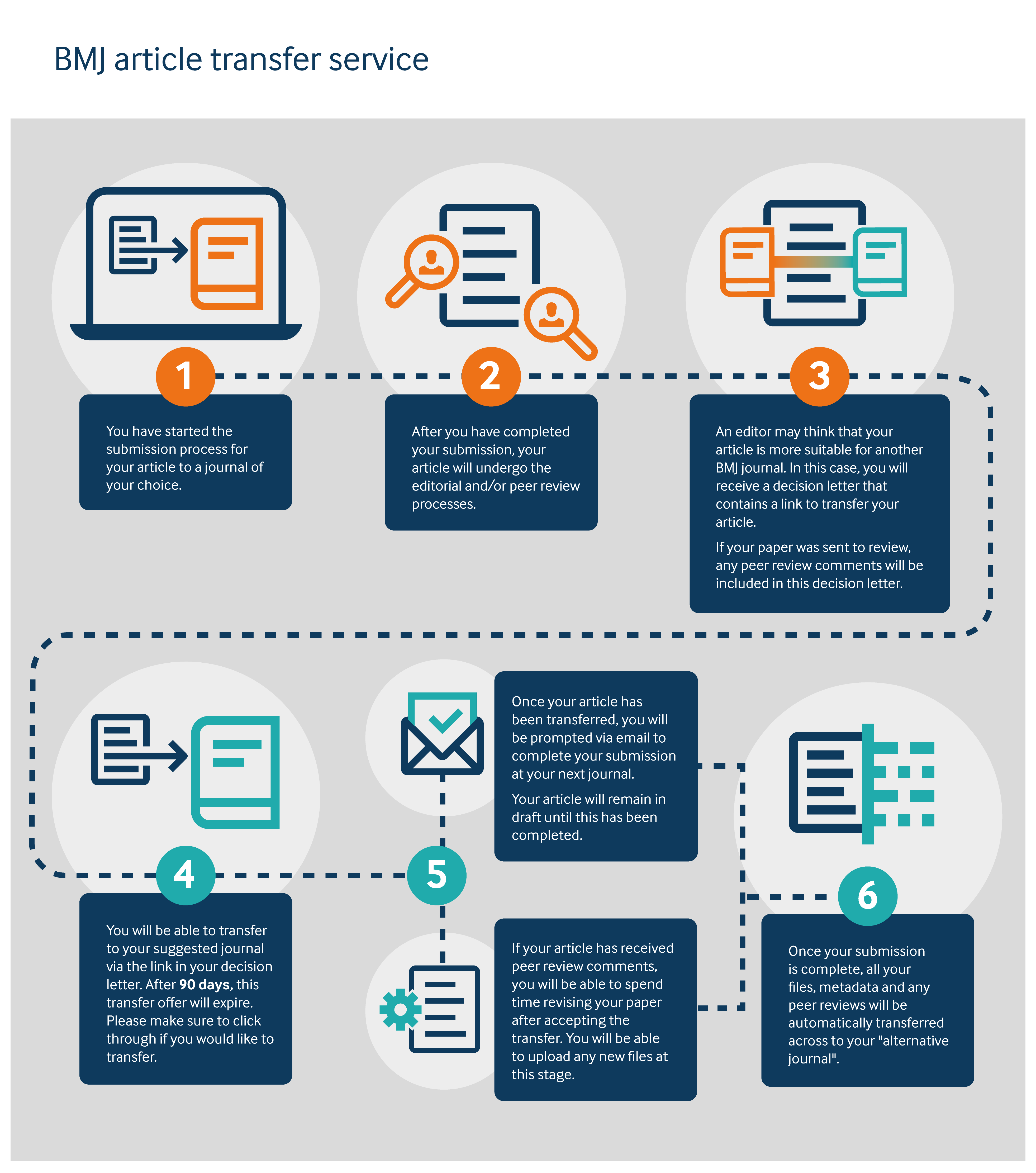BMJ Article Transfer Service
How to transfer your manuscript
Providing authors with a quick, easy and smooth submission and peer-review service is one of the most important aspects of author service we provide across all our journals.
We want to be able to find a home for all high-quality and sound science, clinical research in the most suited BMJ journal. We know that receiving a rejection can be disheartening. To prevent this, and the duplication of efforts of authors, editors and reviewers, BMJ Journals have improved the process of transferring manuscripts. In 2024, The BMJ and journals collection helped 1,545 authors rejected from their first-choice journal to be accepted in an alternative BMJ journal.
Since 2020, our article transfer service has helped over 45k authors from 159 countries get their research published after initial rejection. We’ve successfully transferred 7,044 articles across 67 journals, earning an impressive 68k citations, a collective Altmetric Score of 39k, and 8.1 million pageviews. By making the transfer process smooth, we have saved authors an average of 74 days from initial rejection to publication at an alternative BMJ journal compared to publishing outside BMJ Group. The article transfer service helps give valuable research the visibility it deserves without the long wait.
We now ask all authors to select an alternate journal during the submission process. If a manuscript is rejected at any point during the submission or peer-review process then it will be automatically transferred to the selected alternate journal, together with all its attached files and peer reviews.
BMJ journal editors will now also be able to suggest a more appropriate journal for research they are rejecting, based on the scope of their journal.
Jump to:
- Why would you want your manuscript to be transferred?
- What happens when your manuscript is transferred?
- What should I do with my manuscript if I choose to transfer it?
- Can I appeal a decision on my manuscript and also transfer it to another journal?
- Is there a deadline for when I need to accept my transfer?
- Do I have to transfer my manuscript in order to submit to a new journal?
- How do I select an alternative journal?
- Do I have to pay to transfer my manuscript?
Why would you want your manuscript to be transferred?
- Author choice: you have the final say on if and where your manuscript would be transferred
- Increased likelihood of acceptance: the majority of papers are rejected due to the scope of a journal, however, we have more than 65 journals covering a range of specialties as well as BMJ Open that accept all sound science papers.
- Guaranteed quick initial decision: the transfer system automatically pulls across all manuscript files and any peer reviews to the new journal. This means that you do not have to spend time uploading files to a new system and helps the new editor make a quicker initial decision, based on any previous reviews.
- Saving all researchers’ time: we know that, as an author and a researcher, you may also be a reviewer. We understand that your time is very precious so this new process saves both your and the editor’s time (by not having to find new reviewers). It also saves duplication of efforts for researchers who might be asked to review already peer-reviewed manuscripts. In 2022, authors saved, on average, 74 days to receive an accept decision on their article when they transferred to another BMJ journal compared to if they submitted elsewhere.
- Improving the reach and impact of research: the article transfer service enables authors to publish their work in the most appropriate journal so that it reaches the right audience. In 2022, the authors we helped find a place to publish in our portfolio of journals have achieved an average of 4 citations and an Altmetric Score of 44.
“Being able to transfer the submission to another well-respected BMJ journal made for an appealing mechanism to resubmit as it allowed us to build on the reviews from our first submission.”
Author, West Roxbury VA Medical Center, Boston, USA
What happens when your manuscript is transferred?
The information below applies for transfer of manuscripts when your paper is rejected and automatically transferred to your selected alternative journal.
Note: if you did not select an alternative journal during submission, the below does not apply.

Route 2: Editor suggested transfer with or without review
The information below applies to the transfer of manuscripts when the editor of your paper used the reject-with-transfer decision type and suggests an alternative journal for submission.
Note: if you have already selected an alternative journal during the submission process, the editor will take this into consideration. If you would prefer your manuscript to be transferred to your alternative journal choice, please email the EPA.

Download a PDF of both transfer routes here.
Post-review transfer with editorial consideration at another BMJ journal
At BMJ Group, manuscripts that have undergone peer review before rejection are given a priority transfer to another suitable BMJ journal. Our Transfer Editors will identify a suitable BMJ journal and check if its editor is interested in considering a revised version.
While acceptance is not guaranteed—since all BMJ journals are editorially independent—the editor will review a revised submission if the authors address the previous peer review comments.
Benefits of this scheme
-
Saves authors time by avoiding resubmission elsewhere and additional rounds of peer review.
-
Reduces duplicate effort for editors and reviewers.
-
Increased chance of acceptance; BMJ group portfolio average acceptance rate is 19%, post-review transfer with editorial consideration acceptance rate is 52%.
How it works
- A manuscript is rejected after peer review.
- The Transfer Editor contacts editors of relevant BMJ journals.
- If a journal expresses interest, the Transfer Editor helps facilitate the transfer.
- The manuscript, files, and peer reviews are transferred to the receiving journal.
- A revised version, including point-by-point responses to the reviewer comments and a marked copy is required.
- If authors revise their manuscript based on feedback and reformat it to the new journal’s requirements, acceptance is highly likely.
Will previous editorial or reviewer comments affect the decision?
No. While past feedback is considered, each BMJ journal operates independently. The final decision depends on the receiving journal’s editorial board and scope. Critical peer reviews are expected.
This initiative streamlines the submission process, benefiting both authors and editors.
What should I do with my manuscript if I choose to transfer it?
The original manuscript and other files you submitted will be the files that are sent across to the new journal. We recommend that you revise your manuscript according to the editor and reviewer comments of the original journal.
We also recommend that you revise your manuscript to fit the formatting requirements of the journal you have transferred to. Once you have made these amendments, you can ask the EPA to upload these on to the system on your behalf.
Can I appeal a decision on my manuscript and also transfer it to another journal?
No, you can either appeal your decision or transfer your manuscript. You cannot do both as we do not allow papers to be under simultaneous consideration at more than one journal.
If you do wish to appeal the original decision, however, and your appeal is rejected, we do not accept multiple requests to appeal so you may wish to consider transferring your manuscript to another journal after the appeal rejection.
Is there a deadline for when I need to accept my transfer?
No, however, we recommend that you do not take longer than three weeks. This is especially if you have opted-in to The BMJ scheme – we will have secured a provisional acceptance if you do transfer to another journal. Please note that the link to approve a transfer will expire after 90 days. If you wish to transfer your manuscript after this time period, please email the EPA.
Please note: if you select an alternative journal upon submission or if your manuscript is rejected, your manuscript will be automatically transferred after five days. The manuscript will sit in draft until you accept or decline the resubmission to the receiving journal.
Do I have to transfer my manuscript in order to submit to a new journal?
No, you can submit to a new journal, however, we strongly discourage this as the transfer process is specifically designed to reduce the workload of authors, editors and reviewers by automating the uploading of files and peer-reviews.
How do I select an alternative journal?
Scope is the biggest reason a manuscript will be rejected by a journal. Therefore, we suggest you select an alternative journal in the same way that you would have selected the original journal you submitted to, based on the scope and subject area of your manuscript.
Most of our journals have an open access companion journal that will sit within the same subject area as the hybrid journal but will have a wider scope. The decisions will be based more on the science rather than the novelty of a manuscript.
Additionally, we have two journals at BMJ that cover all types of submissions to our entire portfolio.
- BMJ Case Reports, as the name suggests, accepts clinical case reports.
- BMJ Open accepts all sound science clinical papers.
- BMJ Public Health accepts all sound science, population level papers (including non clinical content).
All of our journals are listed here and you can find out more about each individual journal by clicking through to the journal homepage.
If you would still like more information, you can contact the Article Transfer Service team at transfers@bmj.com.
Do I have to pay to transfer my manuscript?
No, there is no direct fee for transferring your manuscript.
BMJ Case Reports
You will need to have a Fellowship if you choose to transfer your manuscript to BMJ Case Reports. For more information please visit the journal’s website for further information. Please note that having a Fellowship to BMJ Case Reports does not guarantee acceptance, and the Fellowship fee is non-refundable.
Open access publication fees
If you transfer your manuscript to an open access (OA) journal you will be charged an Article Processing Charge (APC) if your article is accepted for publication. See here a full list of BMJ’s OA journals.
If you transfer your manuscript to a hybrid (subscription-based) journal and your manuscript is accepted for publication and you choose for it to be published OA, you will also be charged an APC. You can also choose to comply via the green route, which would not levy an APC. See here the lists of BMJ’s hybrid journals and open access options. The APC for each journal can be found on the individual journal’s website. For more information about APCs, please see here.
Open access agreements, waivers and discounts
Some institutions have OA agreements with BMJ which will either cover the full cost of OA publishing for authors at those institutions or allow authors to receive a discount. Waivers and discounts are also offered in certain circumstances. For details, please visit our open access agreements page and our waivers and discounts page.
Read and Publish agreements
If you are an author from an institution that has a Read and Publish agreement (PAR) for hybrid journals and your manuscript is rejected and transferred from a hybrid to an OA journal, your institution may no longer pay the APC. Please check your agreement for details.
Last updated: March 2025

 Policies
Policies